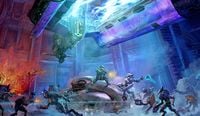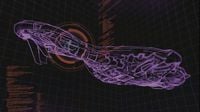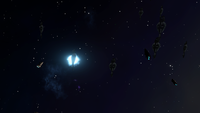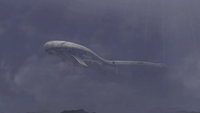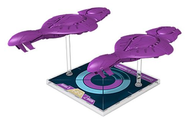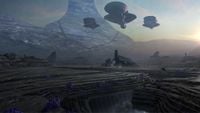CCS-class battlecruiser
From Halopedia, the Halo wiki
- "Mother of God... I'd never thought I'd get close to one of these things. How the hell are we supposed to get inside that monster?"
- — UNSC Marine during the first raid on Truth and Reconciliation.[1]
The CCS-class battlecruiser is a Covenant capital warship. It is one of several cruiser types used by the Covenant, each of which is similar in design but differs in size and function.[2][3]
Specifications
Design details
The CCS-class battlecruiser is a mid-sized capital ship that is used in both offensive and defensive roles. This type of ship is known for its large personnel and equipment capacity, which makes it ideal for infantry, vehicle, and matériel deployments during ground engagements.[2] The vessel is well known for its offensive capabilities, often participating in ship-to-ship combat and in glassing operations. The CCS-class battlecruiser, while not the largest cruiser in service with the Covenant, is the most prominent of the Covenant's ships, and is used in large numbers at the heart of nearly every Covenant invasion force.[3] They are often deployed in three-ship battle groups.[4] The "S", or Salvation, in the cruiser's three-letter classification code, "CCS", denotes that the CCS-class battlecruiser is a dedicated warship capable of destroying its opponents with energy projectors.[5]
Nearly two kilometers from stem to stern, the standard battlecruiser follows the typical architecture of a Covenant ship: a sleek, amphibious design with sweeping contours, bulbous sections, and perfect symmetry,[6] with either two or four fin-like structures beneath the bow. It is shaped this way to allow for mobility in atmosphere during the deployment of infantry, as well as for a significant level of agility when in combat in orbit.[2] Unlike the larger CAS-class assault carrier and the more aggressively deployed CPV-class heavy destroyer, the battlecruiser serves in a somewhat intermediary role: a fully weaponized warship with the ability to apply meaningful military deployment. For this reason it is frequently utilized, easily surpassing the numbers of any other known Covenant vessel.[3]
Armament
CCS-class battlecruisers are typically armed with several dozen energy weapons, which are used both in ship-to-ship combat and in glassing operations.[7] These weapons include pulse laser turrets, very powerful speed-of-light weapons that fire high-intensity laser bolts, radiating energy in the blue wavelength of the electromagnetic spectrum,[3] though they sometimes fire nearer the red wavelength.[8] The turrets are chitinous pods featuring insect-like antennae and are located at various points around the vessel.[9][10]
The battlecruiser also has weapon emplacements along its lateral lines. These weapons include plasma torpedo turrets, which fire long, powerful lances of blue-white, amber, or red plasma contained and guided by a shaped magnetic field.[3][8][11][12][13] The ship also possesses two energy projectors, or "cleansing beams", located on the ventral surface - one fore and one amidships, concentric with the gravity lift.[3] In addition to their use in space combat, the energy projectors are used for low-altitude glassing operations. They can seemingly be charged before firing, causing a powerful initial blast,[14] though they are typically fired as a free-flowing beam.[15][16] This beam is typically bluish white,[15][16][17][18][19] though it also may be red[14] or purple.[20][note 1] These different colors likely represent varying beam intensity.
Internal layout
Control center
Buried deep within the vessel's heart is the control center, also known as the bridge and the Combat Information Center (CIC),[2] from where the entire ship's operations are coordinated. Typically occupied by only the highest-ranking officers, the control center is a large room with a centralized bridge platform overlooking the rest of the room. Holographic controls line the outer perimeter of the raised dais. The viewscreens are also holographic projections, visible at the forward end of the room near the ceiling. The viewscreens can either display exterior views of the ship's surroundings or can display tactical data. They can also be synchronized to the onboard security cameras and can display ship schematics.[9][1][6]
Brigs
The CCS has at least two brigs for holding prisoners. Each is a rectangular room with four force field-secured cells on either side, for a total of eight per brig. Each cell can accommodate a large number of prisoners, although normally only one is placed in each cell, probably for security purposes against the possibility of an organized escape attempt. The cell barriers appear to use the same technology as the shield doors that are common to Covenant installations and vessels, though they obviously do not allow passage from one side to the other. Even plasma bolts and ballistic projectiles can not pass through the fields. The shield barriers can be lowered by a holographic control panel on a raised platform on the far side of the brig opposite the entrance. The cells are arranged at the periphery of a spacious room, with guards patrolling them. The guards usually have active camouflage, using their stealth to monitor the prisoners.[9][1]
Cargo bays
The CCS-class battlecruiser has multiple storage bays. These bays are connected to cargo hatches and corridors that allow the transfer of matériel from other bays to either the gravity lift room or to the hangar bays. The storage bays are two-level expanses that contain weapons, food, and military equipment crates, in addition to storing both land and air vehicles.[9][1]
Hangar bays
The CCS-class battlecruiser contains four bisected hangar bays; two to starboard and two to port. They are each three-tiered, with a large amount of space between the floors and ceilings of each level. Each three-tier bay has two retracting metal doors. The bays feature energy barriers over the openings to allow ships to pass through them while retaining atmosphere and pressure inside the ship. These barriers deny the movement of all forms of matter attempting to enter or leave the hangar bays. Each launch area in the bay is capable of housing dropships and Banshee attack craft. Retracting elevators in the decking of each bay are used to ship Covenant ground and air craft into the bays for launching or for gravity connection to a waiting dropship. These elevators lower into holding areas adjacent to cargo bays.[9][6]
Gravity lift
Like most Covenant warships, the CCS-class battlecruiser is equipped with a single ventrally mounted gravity lift, enabling quick and easy transportation of personnel, vehicles, equipment and supplies to a planet's surface. A large, circular platform can be detached and lowered to the ground to provide a stable surface for disembarking and embarking troops, vehicles, and matériel. The platform has six interlocking hinges and is carried with the ship; when the cruiser is in position over a planet's surface, the six interlocks retract and the beam repels the platform at a controlled descent to the surface. Once on the ground the platform acts as an anchor for the ship. The ship can make use of the gravity lift without the platform, but it must remain in position.[9][6] When attached to the ship, the central gravity platform doubles as the firing port for the energy projector,[3] like that of the CAS-class assault carrier and the CSO-class supercarrier.
The gravity lift bay is similar in design to the cargo bays except that it is only one level high. The gravity lift's door mechanism is situated in the center of the room, with cargo and personnel hatches located around the rectangular bay's walls. Several gravity lift bays are on board the cruisers, not far from the cargo and shuttle bays. Each bay has four cargo hatches along opposite walls for vehicle transfer.[9][1]
Corridors and doors
The class features a labyrinthine network of curved corridors, with circuitry concealed behind purple metal casings. At junctions, gaps in the ceiling and floor appear to accommodate Huragok maintenance personnel, allowing them to float between levels easily and quickly.
Like those of the SDV-class heavy corvette, the doors on the CCS-class battlecruiser open by a three-way system. Unlocked doors are outlined in white light, while locked ones have crimson light. They are protected from electronic intrusion by a 128,000-bit modulating encryption key, but this key can be penetrated by a sufficiently advanced artificial intelligence within minutes.[1]
Engines and engine room
The CCS-class battlecruiser it outfitted with two large tritium plasma-powered[21] repulsor engines for sublight propulsion. The ship's slipspace field generators are fine-tuned enough to make much more efficient and lower-power transitions to slipspace than UNSC ships; making the vessel faster at traveling through the alternate dimension. Covenant ships are also capable of greater precision in exiting Slipspace at a given location.[9]
The engine room contains fiber-optic cables that run from to the control room. These cables are very delicate and, if severed, can cause the vessel to crash.[22]
Operational history
Since the beginning of the Covenant, the battlecruiser has consistently been the hegemony's primary mode of intragalactic transportation.[6] For the centuries leading up to the Human-Covenant War, the CCS was involved in every major event in the Covenant's history, including both peace and conflict. Countless CCS-class battlecruisers were used during the Human-Covenant War in operations ranging from fleet engagements to glassing. They were considered among the most dangerous of Covenant ships and often spearheaded invasions.
The earliest known UNSC encounter with a CCS-class battlecruiser occurred in 2526.[23] Two CCS-class vessels were present at the Battle for Arcadia in February 2531. One was destroyed by the UNSC Texas, UNSC Belfast, UNSC Armstrong and UNSC Pillar of Autumn when caught with its shields down, but the other destroyed the Texas and Belfast, severely damaged the Armstrong and Pillar of Autumn and continued on to Arcadia.[24] Several battlecruisers were later encountered by Admiral Preston Cole's Battle Group India at the Battle of Psi Serpentis in April 2543; these ships, as well as the rest of the Covenant fleet, were destroyed when Cole's flagship, Everest, caused the nearby gas giant Viperidae to go nova.[note 2] The largest known deployment of CCS-class battlecruisers was during the Fall of Reach in summer 2552, in which dozens of such vessels were used in the invasion of the planet. During the Battle of Aszod, one was destroyed by Spartan-B312 with an Onager mass driver.
As Reach was being glassed, several CCS-class battlecruisers from the Fleet of Particular Justice pursued the Halcyon-class cruiser UNSC Pillar of Autumn to Halo Installation 04; after arriving at Halo on September 19, Pillar of Autumn disabled several battlecruisers, most notably Truth and Reconciliation. UNSC forces raided the ship three times, first to rescue Captain Jacob Keyes,[1] then to recover the captain's command neural interface, and finally to recover the ship and use it to escape to Earth. However, First Lieutenant Melissa McKay understood that doing so would allow the Flood to infest Earth; she thus severed the fiber-optic link between the engines and the bridge, causing the ship to crash and killing everyone aboard.[22] On October 20, 2552, thirteen battlecruisers of the Fleet of Sacred Consecration participated in the High Prophet of Regret's botched invasion of Earth; only one of these vessels, Pious Inquisitor, survived, though more would be deployed to Earth during the Prophet of Truth's continuation of the invasion.[25]
After the Great Schism erupted on November 3, CCS-class battlecruisers played crucial roles on both sides. A Flood-infected battlecruiser broke through the Sangheili's blockade of Installation 05 and arrived at Voi, Kenya on November 17; the Flood forms released by this vessel were glassed by the Sangheili Fleet of Retribution, which arrived moments later.[17] At the Battle of Installation 00 on December 11, both sides made use of several CCS-class battlecruisers; though the Brute-led Covenant forces outnumbered the Sangheili-led Covenant three-to-one, the Fleet of Retribution triumphed, turning the tide of the last battle of the Human-Covenant War.
As the Great Schism continued throughout the following seven years, the Sangheili and the Jiralhanae-led remnants of the Covenant continued to make use of CCS-class battlecruisers.[26] Several ships of the class were present during the Battle of Ealen IV, serving within the Sangheili and Jiralhanae fleets tasked with protecting the delegates alongside the UNSC Infinity. The mercenary group under the command of Vata 'Gajat also possessed a number of these ships during the Battle of Ealen IV.[27] Many other CCS-battlecruisers fell into the hands of Kig-Yar scavengers and independent Sangheili factions.[28]
Ships of the line
Ket-pattern
- Truth and Reconciliation - Participated in the Fall of Reach and destroyed over Installation 04 after it was boarded by UNSC Marines and the Flood.
Unknown pattern
- Harbinger of Piety - Participated and destroyed in the Battle of Earth.
- Indulgence of Conviction - Participated in the Battle of Earth, infected by the Flood, and crashed on Earth.
- Pious Inquisitor - Participated in the Battles of Earth and Installation 00, destroyed by Kig-Yar over Shaps III.
- Purity of Spirit - Participated in the Fall of Reach.
- Purveyor of Serenity - Unknown
- Sacred Promise - Heavily damaged in an unspecified battle.
- Triumphant Declaration - Participated in the Battle of Mare Erythraeum on Mars.
- Undiminished Entelechy - Participated in the Battle of Installation 04 and destroyed by Thel 'Vadam to prevent the Flood from leaving.
- CCS-U321 - Participated and destroyed in the Battle for Arcadia and was destroyed by the UNSC Texas, UNSC Belfast, UNSC Armstrong and UNSC Pillar of Autumn after it was caught with its shields down.
- CCS-U624 - Participated in the Battle for Arcadia.
Halo: Fleet Battles
Covenant CCS BattlecruiserThis element includes a single CCS-class battlecruiser.
Covenant Supported CCS BattlecruiserThis element includes a CCS-class battlecruiser and one SDV-class heavy corvette.
Covenant Reinforced CCS BattlecruiserThis element includes a CCS-class battlecruiser and two SDV-class heavy corvettes.
|
Covenant Escorted CCS BattlecruiserThis element includes a CCS-class battlecruiser and one ADP-class escort.
Covenant Defended CCS BattlecruiserThis element includes a CCS-class battlecruiser and two ADP-class escorts.
Covenant Paired CCS BattlecruisersThis element includes two CCS-class battlecruisers.
|
Trivia

|
Browse more images in this article's gallery page. |
- Battlecruisers were a ship class used by European, American and Japanese navies during the First and Second World Wars, developed as an evolution of the armored cruiser, being faster and better-armed than their predecessors, often featuring armaments equivalent to a larger battleship but with lighter armor. By the 1930s, only the Royal navy was using the term "battlecruiser" for its older ships, as other navies replaced battlecruisers with battleships.
- During the development of Halo 2, Solemn Penance was originally going to be a CCS-class battlecruiser, as seen in the E3 2003 demo.
- The battlecruisers featured in Halo 3 and most later media have four fins instead of two, like those of the Truth and Reconciliation. These battlecruisers also feature the Marathon logo on their launch bays.
- In the level New Alexandria in Halo: Reach, if the player performs the flyable Pelican and Phantom Easter egg and flies inside one of the CCS-class battlecruisers outside of the map, they will find a small cube in the center of either ship. It is a cube map, which contains the texture for the vessel.
- If the Mythic skull is turned on while playing Halo: Reach, the CCS-class battlecruiser at the end of the level The Pillar of Autumn requires two shots from the Onager to be destroyed.
Gallery
- HCE - Covenant ship 3.png
Concept art of the cruiser's front for Halo: Combat Evolved.
- HCE - Covenant ship 4.png
Concept art of the cruiser's bottom.
- Covenant Attack Ship.jpg
Finalized concept art by Eddie Smith.
An underbelly view of a CCS-class battlecruiser from Halo 2. Note the design similarities to the Truth and Reconciliation.
Dorsal, starboard, and ventral views of the CCS-class battlecruiser from Halo 3.
A CCS-class battlecruiser firing its plasma torpedo and pulse laser turrets in The Package.
A CCS-class battlecruiser entering slipspace in Origins.
Covenant forces boarding Phantoms in a hangar bay on a CCS-class battlecruiser from Deliver Hope.
A CCS-class battlecruiser hovering over a ruined city during the Battle of Fumirole.
A CCS-class battlecruiser with its shield collapsing by the explosion of an MFDD.
- Reach-Concept-CCS-Glassing.jpg
Early concept art of CCS-class battlecruisers glassing New Alexandria in Halo: Reach.
Finalized concept art of CCS-class battlecruisers glassing Aszod in Halo: Reach.
Layout reference of the CCS-class battlecruiser.[note 3]
CCS-class battlecruiser statistics compiled by Stephen Loftus.
Concept art of the battlecruiser Truth and Reconciliation's gravity lift in Halo: Combat Evolved Anniversary.
A holographic rendering of a CCS-class battlecruiser in Halo: Combat Evolved Anniversary's terminals.
CCS-class battlecruisers around Installation 04 in Halo 2: Anniversary.
CCS-class battlecruisers engaging the UNSC Home Fleet during the Battle of Earth.
A CCS-class battlecruiser in Installation 05's atmosphere.
CCS-class battlecruisers in Halo: Fleet Battles.
Battlecruisers over the Ark in concept art for Halo Wars 2.
List of appearances
|
Notes
- ^ The purple beams seen in Halo 2 are emitted from assault carriers' energy projectors, though it is reasonable that a battlecruiser's energy projectors could also emit purple beams.
- ^ According to The Impossible Life and the Possible Death of Preston J. Cole, the CCS-class battlecruiser was first encountered at the Battle of Psi Serpentis in 2543. This contradicts Halo Wars: Genesis, which shows Cole's fleet engaging such vessels in 2526; Halo Wars, in which two CCS-class ships are encountered at Arcadia in 2531; data pad 10, which states that the Assembly's findings about glassing were derived from observing the CCS class in 2526; and Halo: The Essential Visual Guide and the Halo Encyclopedia, which state that the vessel was encountered throughout the war.
- ^ The layout reference image is compiled based on both all the canonical information as viewed in Halo: Combat Evolved, the novels, the latest reference guides, and the Halo Legends episode The Package. If new information contradicts this information, the image will be updated accordingly.
Sources
- ^ a b c d e f g Halo: Combat Evolved, campaign level, The Truth and Reconciliation
- ^ a b c d Cite error: Invalid
<ref>tag; no text was provided for refs namedENC - ^ a b c d e f g Cite error: Invalid
<ref>tag; no text was provided for refs namedEVG - ^ Halo: Combat Evolved, campaign level, The Pillar of Autumn
- ^ Halo Waypoint: Canon Fodder: Have S'moa
- ^ a b c d e Halo Waypoint: Battlecruiser (defunct, backup on Archive.org)
- ^ Halo: Combat Evolved PC Strategy Guide, page 73
- ^ a b Halo Legends, The Package
- ^ a b c d e f g h Cite error: Invalid
<ref>tag; no text was provided for refs namedStnLfts - ^ Halo: The Fall of Reach, page 123, page 146 (2010 edition)
- ^ Halo: The Fall of Reach, page 8, page 22 (2010 edition)
- ^ Halo: First Strike, page 21, page 33 (2010 edition)
- ^ Halo 3, campaign level, The Covenant
- ^ a b Halo: Reach, campaign level, New Alexandria
- ^ a b Halo 3, campaign level, Tsavo Highway
- ^ a b Halo 3: ODST, campaign level, Coastal Highway
- ^ a b Halo 3, campaign level, Floodgate
- ^ Halo Wars
- ^ Halo Legends, Origins
- ^ Halo 2, campaign levels, Cairo Station and Regret
- ^ Halo: Ghosts of Onyx, page 331
- ^ a b Halo: The Flood, page 332
- ^ Data pad 10
- ^ Halo Wars, campaign level, Arcadia City
- ^ Halo 3: ODST
- ^ Halo: Evolutions - Essential Tales of the Halo Universe, The Return, page 506
- ^ Halo: Escalation, Issue 1
- ^ Halo 4: The Essential Visual Guide, page 195
| ||||||||||||||||||||||||||||||||||||||||||
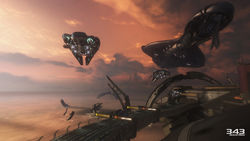

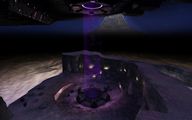
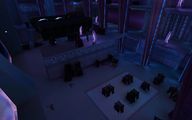

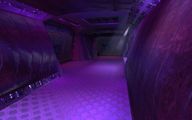
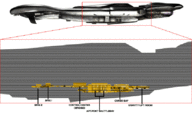
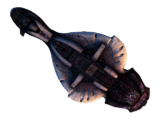
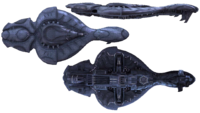
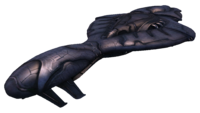
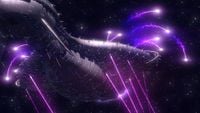

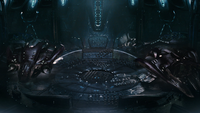
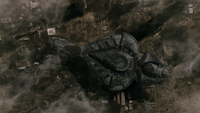
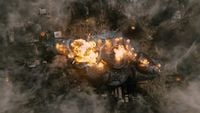
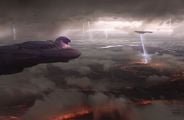
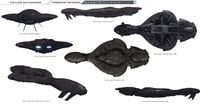
![Layout reference of the CCS-class battlecruiser.[note 3]](https://halo.wiki.gallery/images/thumb/4/48/HR_CCS_layout_ref.jpg/200px-HR_CCS_layout_ref.jpg)


